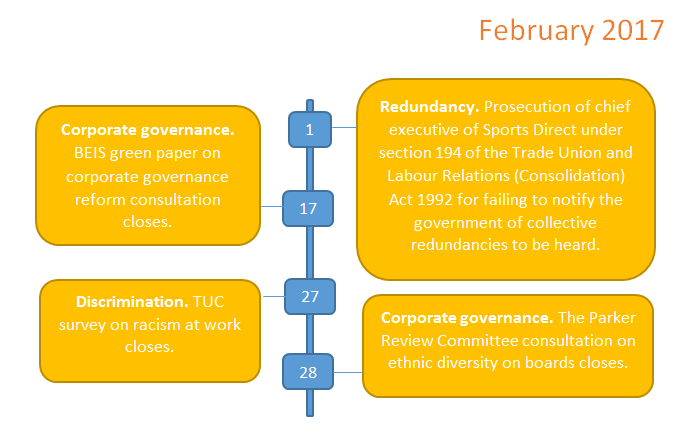On 17 January 2017, the Prime Minister gave a speech on the UK government’s negotiating objectives for exiting the EU. This was followed on 24 January by the Supreme Court’s decision that an act of parliament is required before the Article 50 exit process can be triggered. As a result, the European Union (Notification of Withdrawal) Bill was presented to the House of Commons on 26 January, with the promise of a white paper to be published as soon as possible. The government still intends to issue the Article 50 notice by the end of March.
The Supreme Court handed down its eagerly awaited decision that a bus driver needed to do more to assist a disabled passenger when a wheelchair space was occupied by another passenger with a baby buggy. Although not an employment law case, it will no doubt be cited in the employment tribunals when dealing with reasonable adjustment cases.
The Court of Appeal refused an injunction to prevent strike action by ASLEF, the train driver’s union, in December 2016 and January 2017. The Northern Ireland Court of Appeal refused permission for the Attorney General to refer the “gay cake” case to the Supreme Court, although the bakery is reported to be seeking leave direct from the Supreme Court.
The EAT upheld a decision that a dismissal by reference to expired warnings was fair as the employer had been entitled to conclude, in the light of 17 expired warnings, that “enough was enough”. The EAT also considered whether type 2 diabetes is a progressive condition (and therefore a disability) under the Equality Act 2010, and held that a disability discrimination claim was not precluded by an earlier COT3 since it arose out of different facts.
In a further interesting case, with similarities to last October’s Uber decision, a tribunal has held that a cycle courier for Citysprint was a worker under the ERA 1996 rather than a self-employed contractor.
Two notable consultations were launched this month. The UK government launched a very short period of consultation on draft strategic guidance for the Institute of Apprenticeships. The Institute is due to be launched in April 2017 and the consultation closes on 31 January 2017.
The Scottish government also announced a consultation on the draft Gender Representation on Public Boards (Scotland) Bill, which closes on 17 March 2017. Comments are invited in particular on the Gender Representation Objective, by which a public board would aim to have an equal mix of men and women, and on a positive action “tie breaker” provision.
The Welsh government has tabled a bill to exempt devolved Welsh authorities from parts of the Trade Union Act 2016, although the UK government has said that Wales has no power to do this as employment law is not devolved. This could lead to another devolution challenge in the Supreme Court. The Welsh government won its previous skirmish in 2014 over the right to set agricultural wages.
The government responded to the recommendations made by the Women and Equalities Committee calling for better pregnancy and maternity protection. It intends to provide additional protection from redundancy for new and expectant mothers.
Several reports on equality have been published. The Equality and Human Rights Commission published a report on whether the law on religion or belief is working, the Women and Work All Party Parliamentary Group published a report on the difficulties faced by women returning to work after a career break, and the TUC reported that 52% of women have experienced sexual harassment at work. Following an online petition, the House of Commons Petitions Committee and the Women and Equalities Committee have published a joint report on high heels and workplace dress codes, calling for urgent action to improve the effectiveness of equality law in this area. A debate will be held on 6 March in Westminster Hall.
The government appointed a new chief to tackle minimum wage abuse, Jeremy Corbyn proposed that boardroom pay should be capped at 20 times the company average, HMRC published ten of the most bizarre excuses for not paying the minimum wage, the Prime Minister issued new plans to tackle mental health at work, and Hays reported a hiring decline since the Brexit referendum. The review of employment tribunal fees is now “genuinely imminent”, and ELA has criticised the government’s plans for online tribunals.
In our blog, Craig Rajgopaul looked at the recent case law concerning deposit orders in the tribunal, in Approaching deposit orders after H v Ishmail.
Next month
Key developments to look out for in February 2017.

For recent and forthcoming developments, don’t forget What to expect in employment law, Case tracker and Legislation tracker.



